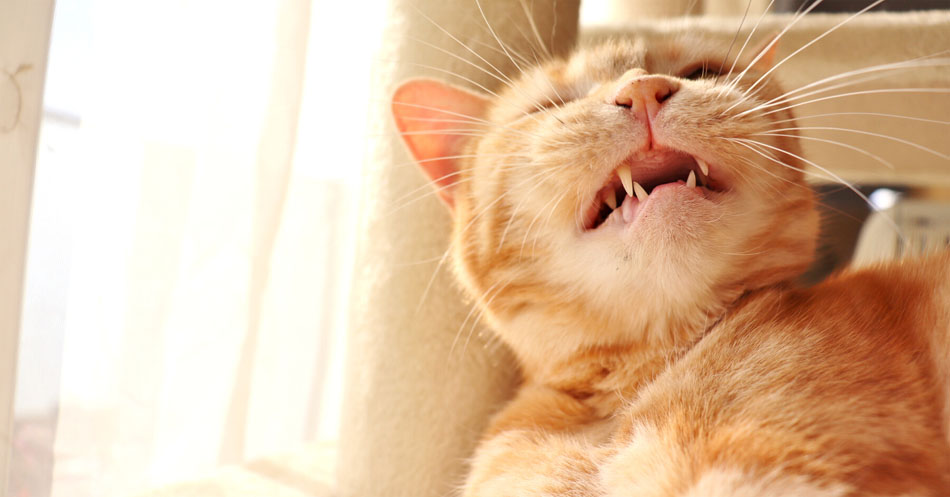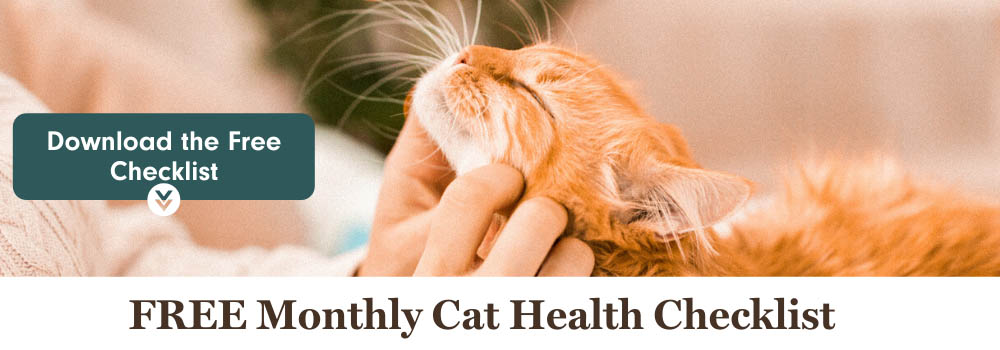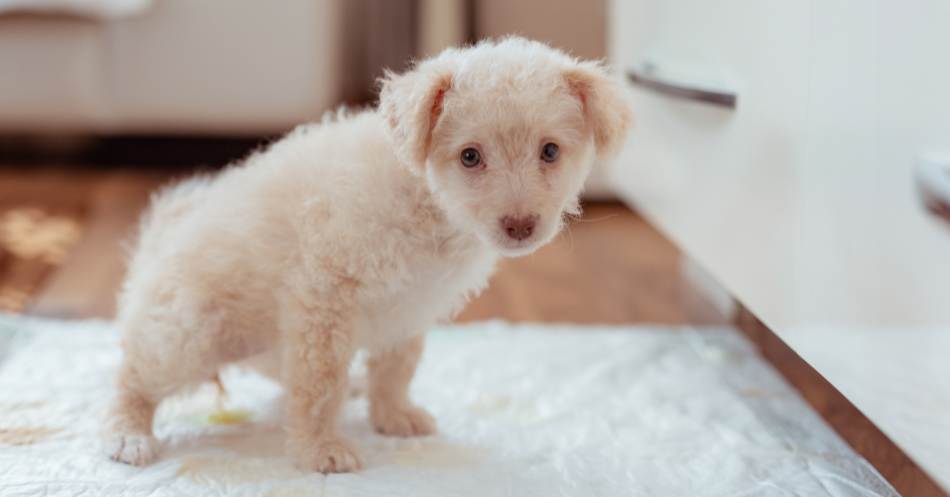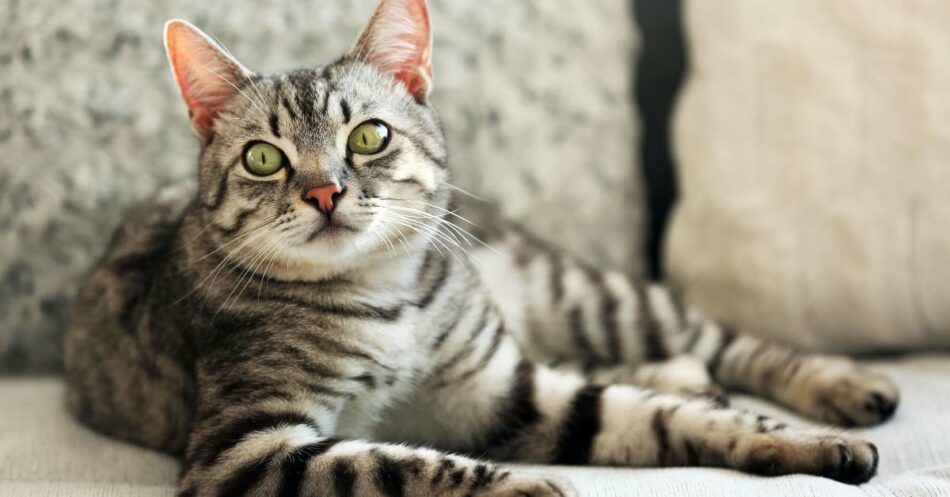
Can Cats Get Colds? Why Is My Cat Coughing and Sneezing?
As flu and cold viruses circulate, it’s pretty typical to hear a sniffle, sneeze, or cough here or there. But what happens when those sounds are coming from your cat?
It may leave you wondering: Why is my cat coughing so much? Why are they sneezing? Can my cat get a cold?
The short answer is YES! Cats can catch colds, which are more commonly referred to as feline upper respiratory infections. In fact, the symptoms are very similar to the common cold that affects humans. Sneezing and watery eyes are usually the first signs that your cat has a cold. But look out for these other symptoms too.
Signs and Symptoms of a Cat Cold
- Excessive sneezing
- Sniffles
- Watery eyes
- Squinting or holding their eyes closed
- Runny nose
- Mild fever (see your veterinarian for anything over 102.5 degrees Fahrenheit)
- Reduced appetite
- Occasional coughing
- Congestion leading to open-mouth breathing
Feline upper respiratory infections can be caused by bacteria and viruses, just like colds in people.
How Do Cats Catch Colds?
“Cat colds,” or “cat flu,” also called upper respiratory infections, are easily transmissible between felines through coughing and sneezing. About 90% of viral infections are caused by feline herpesvirus and feline calicivirus.
Feline herpesvirus-1 (FHV-1, or also called feline viral rhinotracheitis) and feline calicivirus (FCV) are two common viruses that cause symptoms like those of a cold, such as sneezing and a runny nose. FHV-1 primarily targets the respiratory system and eyes, while FCV can sometimes lead to more severe issues, affecting the lungs, joints, or other organs. It’s often difficult to tell the difference between the two infections just based on symptoms.
Both infections are not contagious to humans and are only specific to cats. Getting your cat vaccinated against both may not offer a 100% guarantee against contracting these two types of diseases, but it’s still a vital step in proactive pet parenting. These vaccines serve as a valuable line of defense by minimizing symptoms and warding off more severe illnesses.
Outdoor cats or cats who have been boarded with other cats are particularly susceptible to catching these viruses.
Think about how much cats love to groom one another, and it’s not hard to understand how easily infections can be passed along.
Your young kitten or senior cat is more likely to catch colds. And cats with compromised immune systems are at particularly high risk of getting sick.
How Do Indoor Cats Catch Colds?
You might think that since your furry friend hasn’t stepped a paw outside, they’re immune to such troubles. However, you’d be surprised.
Cats who contract the viruses will have it in their system for life. They’ll experience periods where the virus is inactive and appear healthy. However, stressors such as being boarded or groomed can weaken their immune system, triggering the dormant virus.
Your indoor cat may have been exposed to these viruses while they were in an animal shelter or kennel or when you’ve taken them to a veterinary clinic or pet store. Indoor cats can also get ill by interacting with outdoor cats through a screen door or window. Additionally, us humans can unintentionally bring in germs on our clothing or hands, though this is rare.
But what if your cat’s sneezing and coughing are not due to a cold? What could be causing these symptoms?
Why Is My Cat Coughing?
The most common cause of cat coughing is hairballs. Even so, although cats do cough, it’s usually not as much as other animals. So if you’ve ruled out the possibility of your cat having a cold or hairballs and their cough persists, it’s time to look at other causes.
There are several reasons why your cat is coughing, some of which are very serious. A few
examples include asthma, other types of infections, certain parasites, and allergies.
Asthma and Bronchitis
Feline asthma is an acute or chronic inflammation of the airways. Feline bronchitis refers to coughing or wheezing that comes from inflammation in the lower airways.
Cats have sensitive noses. A host of things can set off your cat’s asthma: pollen, cigarette smoke, perfume, dust from clay cat litter, essential oils, and even mold/mildew. When triggered, your kitty’s airways will spasm, making it difficult for them to breathe.
Cats who are between two and eight years old, are overweight, or have dental diseases tend to be at a higher risk for developing feline asthma and bronchitis.
Parasitic Worms
Parasitic worms, like heartworms, can cause your feline friend to cough. Feline heartworm disease can actually be life-threatening. The parasites are transferred through mosquito bites and can bring on a slew of other symptoms besides coughing. These symptoms include vomiting, diarrhea, difficulty breathing, loss of appetite, and lethargy.
If your cat has a persistent cough and displays any of these symptoms, visit your veterinarian right away.
In general, it’s normal for cats to cough. If your kitty is otherwise healthy, there’s little need for concern. But if your cat’s coughing is severe, persistent, productive, or recurring, take your kitty to the vet.
It’s important to have your cat evaluated in order to pinpoint what’s really causing your cat to cough so much.
Why Is My Cat Sneezing So Much?
Let’s admit it, your cat’s tiny little sneezes are pretty adorable. But is there ever a time when you should worry about why your cat is sneezing so much?
Thankfully, most causes of sneezing are easily treatable and nothing to worry about. Aside from the common cold, your feline friend may be sneezing due to the following:
Nasal and Sinus Issues
This can be a common complication of your cat’s cold. In addition to your cat’s cold symptoms, you may notice yellow or green nasal discharge. And your kitty may even begin pawing at their face.
Your veterinarian may recommend a nasal flush, antibiotics, or steroids to open up their nasal cavities.
Allergies
Allergy season can induce sneezing fits in people, but that’s not always the case in cats. Usually, allergy problems show up as skin irritation. However, occasionally, pollen or indoor allergens can cause your kitty to sneeze.
Pin me!

External Irritants
As mentioned, plenty of things can trigger your cat’s nasal symptoms. Certain spices in your kitchen, cleaning products, or even dust can cause your feline friend to sneeze.
You might notice that your cat’s sneezing fits coincide with cleaning days or after lighting a scented candle. If you suspect certain smells are causing the sneezing, consider making some lifestyle changes, like switching to unscented cleaning products.
Foreign Materials
Though rare, sniffing foreign materials like tiny pieces of plastic, food, or even a stray feather can lead to sneezing spells. In some cases, a foreign object might get lodged in your cat’s nose, which might require a visit to the vet for removal. Keep an eye out for continuous sneezing or pawing at the nose as a sign that something’s amiss.
Cat Cold FAQs
Although it’s much less common, it is possible for cats to catch kennel cough. The bacteria Bordetella bronchiseptica causes kennel cough in both cats and dogs. It causes an infection in the throat and upper respiratory tract.
The bacteria spreads through coughing, sneezing, shared water bowls, and toys. It can even be passed between pet parents and other fur family members!
Cats can get kennel cough from infected dogs, and humans can accidentally spread the bacteria from one infected pet to another.
Fortunately, kennel cough tends to be mild in cats. But if your kitty’s symptoms worsen or they are immunocompromised, visit your veterinarian right away.
If your cat catches a cold, their symptoms should resolve within a week or two. But keep a watchful eye on them in case their symptoms don’t improve. An unresolved cold could turn into something more serious like pneumonia.
This is especially important if your sick cat falls into a high-risk category because they are unvaccinated, nursing, elderly, a kitten, or has a compromised immune system. In cases like these, make an appointment with your veterinarian.
And if your kitty’s condition worsens, like having difficulty breathing or has stopped eating, take them to the veterinarian right away.
When your kitty is under the weather, you’ll want to keep them as comfortable as possible. Add warm, cozy blankets to their favorite napping spots.
Try warming up their food to make it easier to swallow and to encourage their appetite. If the air in your home is dry, try using a humidifier to help their breathing.
If your kitty has a lot of gunky discharge around their eyes, use a cotton ball soaked in warm water to clean the area as needed. You can also try a product like this one from Vetericyn. Use code PETLIVING at checkout and save 20%.
At Pet Living, we love this ex-purrt tip for when your kitty is congested: place them in their carrier and place a bowl of hot water in front of the cage. Then cover both with a blanket for approximately 15 minutes. This small breathing treatment should give your cat’s stuffy nose a bit of relief.
Note: Never give human cold medication (or any medication without the advice of your veterinarian) to your cat.
Although there’s no cure for your cat’s cold, as mentioned, there is a vaccine. It’s quite effective at reducing the frequency and severity of infection in cats.
Keeping your cat indoors and lessening their exposure to outdoor cats will also help cut down their risk of catching a cold. Of course, preventative measures like regular visits to the veterinarian and at-home wellness checks can also reduce their risks.

The Tail End
It’s true, cats can get colds! With some extra TLC, your kitty’s symptoms should pass in no time.
On the other paw (pun intended), if your cat is constantly coughing or sneezing, there may be another explanation. Visit your veterinarian to rule out more serious illnesses.
In the meantime, keep them comfy and give them lots of love while they’re on the road to recovery.







Comments (0)